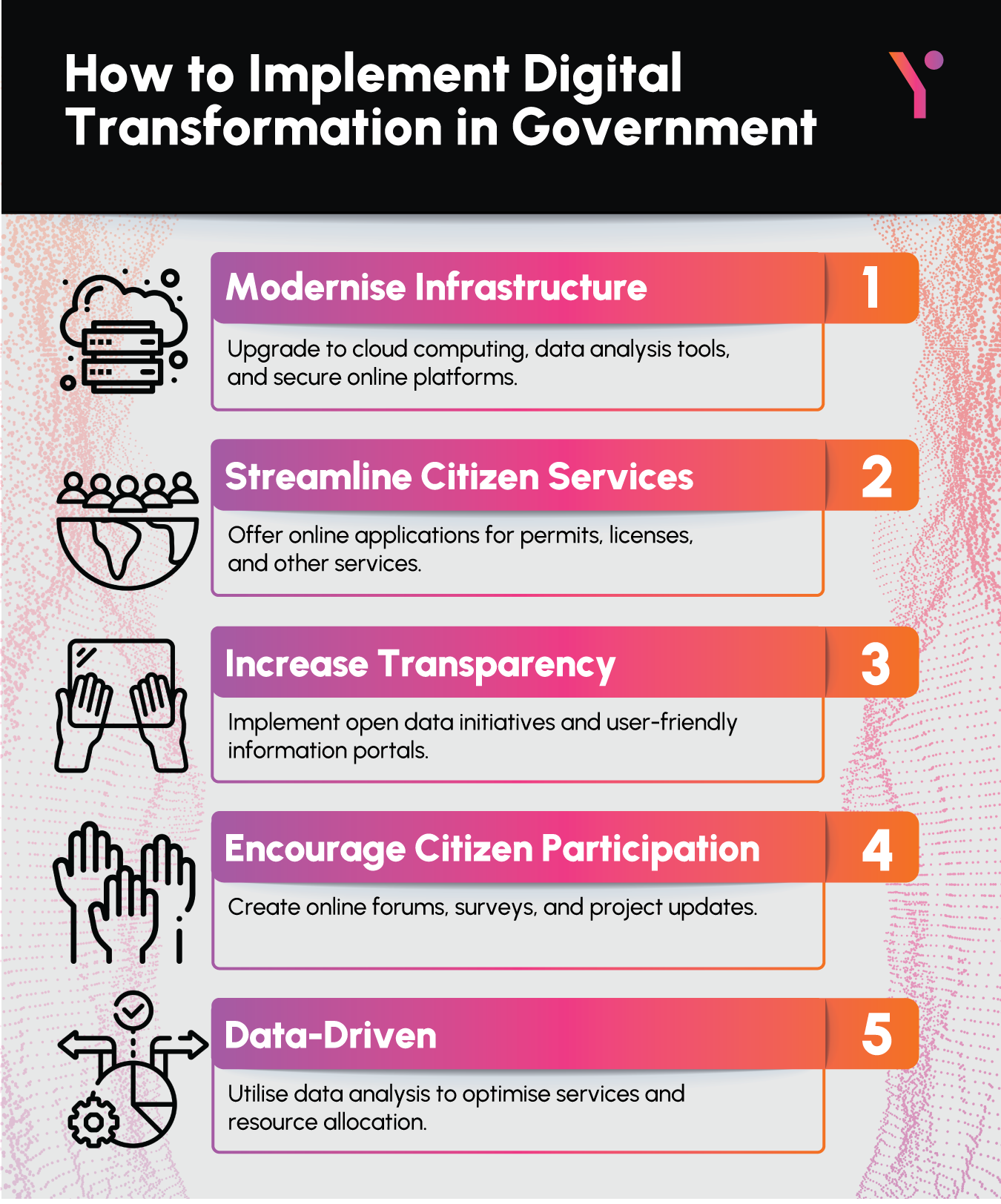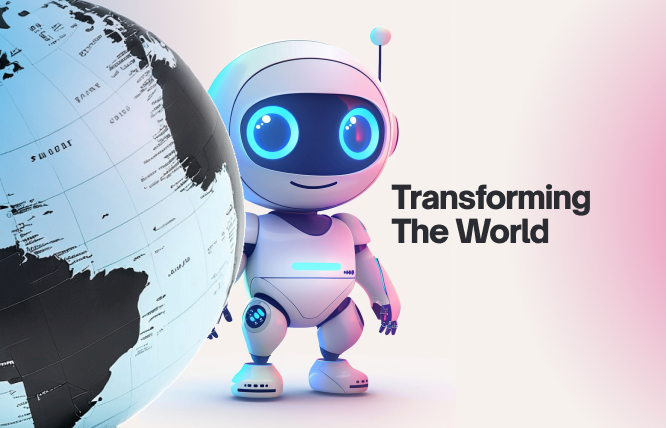Introduction
This blog post offers a concise exploration of the digital transformation in government sectors. We delve into five key pillars that will underpin a successful transition to a more data-driven, citizen-centric, and technologically advanced government. Our analysis aims to empower readers with a clear understanding of the opportunities and considerations for effective digital governance.
Citizens today expect a government experience that mirrors the ease and efficiency they find in the private sector. This digital transformation in government is all about spreading awareness and keeping a good connection with people.
A recent study found that 72% of citizens report frustration with outdated government online services. This means we have significant gap to fill in government in terms of technological advancements. Digital transformation offers a powerful solution, unlocking a new era of citizen-centric governance.

Seamless Citizen Services Online
Forget the frustration of phone calls and endless paperwork. Imagine renewing your driver’s license or registering a business in minutes – that’s the reality with progressive website applications. A 2023 McKinsey report highlights that governments implementing these online portals have seen a staggering 60% reduction in citizen service wait times. These user-friendly platforms empower citizens with 24/7 access to essential services, fostering a sense of empowerment and satisfaction.
Efficient Administrative Processes
Government agencies are often bogged down by manual workflows and outdated systems. Digital transformation tackles this head-on by implementing robust business management solutions. These solutions are more than just fancy software; they’re game-changers. We all must agree with the fact that agencies utilizing business management solutions experience an increase in internal efficiency. For instance, an employee training management system may automate onboarding, and free up valuable time for HR personnel. The ripple effects are significant, allowing government agencies to operate with greater agility and focus on higher-level priorities.
Digitally Upgraded Public Records Management
Nowadays no one goes through public records manually. We now have digital transformation systems that foster secure, centralized electronic recordkeeping systems. This not only improves accessibility for authorized personnel but also strengthens data security. An online study of 2022 reveals a 40% decrease in data breaches within government agencies that implemented digital recordkeeping systems. Citizens also benefit, with online portals offering convenient access to public records, fostering transparency and accountability.
Secure Digital Identity Verification
As government services move online, robust security measures become paramount. Digital transformation empowers the development of secure digital identity verification systems. These systems ensure only authorized individuals can access sensitive information and conduct online transactions. Another study demonstrates the effectiveness of these systems, with a reported 80% reduction in fraudulent activity within government agencies that implemented them. This not only protects citizens’ privacy but also safeguards government systems from cyber threats.
Policy Making Powered by Data
Intuition and guesswork are being replaced by data-driven decision making. By analyzing vast datasets, governments can identify trends, measure program effectiveness, and craft evidence-based policies that truly address the needs of citizens. Imagine using real-time crime data to optimize police patrol routes, or leveraging healthcare statistics to target public health initiatives in high-risk communities. Data empowers smarter, more impactful policy making.
Engaging Public Awareness Initiatives Online
Gone are the days of relying solely on traditional media channels. Interactive online platforms allow for a two-way dialogue between government and citizens. Social media campaigns can raise awareness about critical issues, while online forums can facilitate discussions and gather public feedback. Think of hosting virtual town halls on Facebook Live to discuss proposed legislation, or utilizing targeted social media ads to educate citizens about new government programs. Digital engagement fosters a more informed and involved citizenry.
Interactive Community Platforms
Citizen participation is no longer an afterthought; it’s a cornerstone of effective governance. Interactive community platforms empower citizens to actively participate in decision-making processes. Imagine online portals where residents can submit ideas for neighborhood improvement projects, or platforms where citizens can vote on budget priorities. These platforms foster a sense of ownership and encourage citizens to become active stakeholders in their communities.
Robust Regulatory Compliance Measures
As government services move online, robust cybersecurity measures become paramount. Digital transformation necessitates the implementation of comprehensive data privacy regulations and robust IT infrastructure to safeguard sensitive information. Think of developing clear cybersecurity protocols for government agencies or establishing strong digital identity verification systems to prevent fraud. These measures ensure a secure and trustworthy digital environment for all.
Resilient Infrastructure Development
The foundation of a successful digital government is a robust and reliable technological infrastructure. This includes investments in high-speed internet access, secure cloud storage solutions, and user-friendly government websites. Think of expanding broadband internet access to underserved communities or upgrading government data centers to ensure optimal performance. By investing in infrastructure, governments create a solid foundation for a thriving digital ecosystem.
Secure E-Voting Systems
Secure E-Voting Systems for Government: Revolutionizing the voting process, secure e-voting systems enable citizens to cast their votes remotely, boosting inclusivity and participation. Advanced authentication and encryption ensure the integrity of elections, while real-time tabulation expedites results reporting. Despite cybersecurity concerns, proactive measures can mitigate risks, affirming e-voting as a pivotal tool in modernizing democracy.
Addressing Government Needs with Essential Software Solutions
Legacy systems and paper-based processes plague many government agencies. This creates inefficiency, delays services for citizens, and hinders transparency. Must-have software solutions address these issues by:
Enterprise Resource Planning (ERP) Systems
Enterprise Resource Planning (ERP) systems integrate core functions like finance and HR, eliminating data silos and boosting internal efficiency.
Customer Relationship Management (CRM) Software
Customer Relationship Management (CRM) software allows governments to manage citizen interactions effectively. This means faster response times, personalized service, and stronger citizen engagement.
Document Management Systems (DMS)
Document Management Systems (DMS) centralize document storage and retrieval. This makes information readily available to both government employees and citizens, fostering trust and accountability.
Electronic Document Signing Software
Electronic Document Signing software eliminates the need for physical paperwork and expedites approvals, saving time and resources.
Conclusion
The digital revolution in government is no longer a question of “if” but “when.” The benefits are undeniable – increased efficiency, improved transparency, and a more empowered citizenry. While challenges remain, they are not insurmountable. By embracing these key pillars and partnering with qualified technology experts, governments can unlock the vast potential of digital transformation and usher in a new era of effective and responsive governance. The time to act is now. Let’s build a future where technology empowers governments to serve their citizens better than ever before.
Frequently Asked Questions
Many government agencies rely on outdated systems. Business management solutions can streamline workflows, improve data management, and enhance communication, all of which are crucial for a successful digital transformation.
A progressive website application is a web-based platform that offers a seamless user experience across different devices. In the context of government, this could mean offering citizens and businesses easy access to services and information through a user-friendly and mobile-responsive website.
Absolutely! A custom software development company can create solutions tailored to the specific needs of a government agency. This could involve developing new applications, integrating existing systems, or creating custom functionalities to enhance efficiency and citizen engagement.
There are several challenges of digital transformation in government, including:Legacy systems: Many government agencies rely on outdated technology that can be complex and expensive to upgrade.Lack of skilled personnel: Implementing new technologies often requires specialized skills that government agencies may not have readily available.Resistance to change: Some government employees may be hesitant to adopt new ways of working.Security concerns: Protecting citizen data is paramount, and digital transformation initiatives must ensure data security.
Several strategies can help, such as:A well-defined plan with specific goals and timelines is essential for a successful digital transformation.Equipping employees with the necessary skills through an employee training management system.Implementing robust cybersecurity measures is essential to protect sensitive data.Working with a custom software development company can provide the expertise needed to navigate the challenges and achieve desired outcomes.
Have questions or feedback?
Get in touch with us and we‘l get back to you and help as soon as we can!




